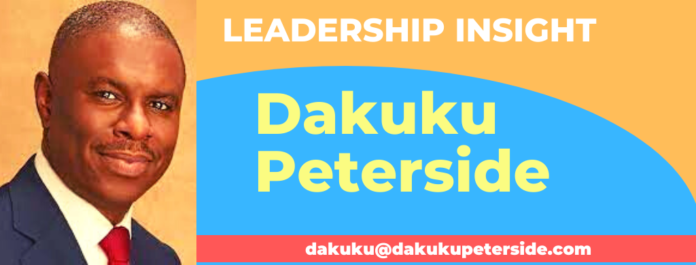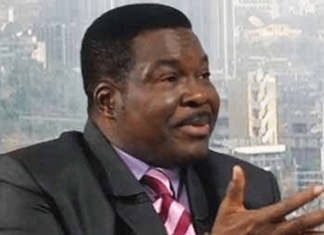If the Nigerian middle class is not catered for urgently, they may be responsible for Nigeria’s next phase of the uprising.
Last week, I extensively talked with a set of enterprising, upwardly mobile young men and women in Abuja. I chose to label that interactive session “lamentations of despairs”. These young people are your typical hustlers. That conversation centred on an economic phenomenon our economic gurus neglected. But it is responsible for why our economy is not healthy. An in-depth understanding of the phenomena will undoubtedly mark a turning point in our approach to economic planning and governance. The dominant economic practice often focuses on the extremes – either trying to stop the rich from exploiting the system or pulling the poorest of the poor among us up through poorly executed social assistance programmes. Some economic regimes have tried to do both. But all such economic adventures failed for many reasons beyond the purview of my consideration. However, a critical factor that has contributed to such failure is the inadequate attention such economic regimes have given to those in between – the middle class.
This middle class is that critical mass that forms the glue that keeps modern liberal democratic societies from falling apart. It has always been a driving force in national economic productivity. The term defines a social class whose education, tastes, consumption patterns and activities drive the economy. The indices of middle-class living are measures of a nation’s economic health. Cars, new homes, appliances, vacations, leisure, healthcare, and education are the visible markers. Each marker drives a chain of economic activities. This class is represented by those men and women who have decent-paying jobs or run Small and Medium Enterprises (SMEs) and dream of owning a modest house, sending their children to affordable schools, having access to quality healthcare, having their means of mobility and generally retire to a good life. It also includes the young independent professionals who work hard to have a decent life, rewarded by the power of their skills.
The United Nations categorises them as those whose income is between $10 (about N7,500) and $100 (about N75,000) daily. This categorisation is comprehensive and captures most middle-class income in developing countries. In Nigeria today, a person at the lowest rank of this spectrum earns about N240,000 per month and at the high spectrum, N2,400,000 per month. This upper range of earnings for the upper middle class may be unattainable to most people, apart from a few high executives, and some may argue that those people should not be regarded as middle-class in Nigeria today. The disparity between the lower and upper-income range within the middle-class band is huge. However, the African Development Bank categorises the middle class as those earning between $2 (N1,600) to $20 (N16,000) daily. This translates to N48,000 monthly for the lower band and N480,000 for the upper band. Some argue that these figures also may not reflect the realities of the middle class’s income range in Nigeria. This confusion in pinning down exactly what constitutes middle-class income is at the root of the total neglect it has received from policymakers.
The World Bank defines poverty as living below $1.90 per day. Efforts aimed at reducing poverty can be targeted and outcomes measured. Middle-class income is vague and fluid, and such interventions are difficult to measure results.
The challenge in Nigeria today is that this class of people are almost wiped out inadvertently. We now have predominantly rich and impoverished people. The rich are those who took advantage of the system. The poor are those who have no access. The middle class, which in other liberal democracies are the ones who drive production and consumption, is vanishing. A 2022 survey by the African Development Bank shows that the middle class makes up about 23 per cent of the population in Nigeria. They are still earning the same income, but the purchasing power is completely gone. Imagine a Director in a federal ministry earning N6 million per annum (upper range of middle-class income). House rent in Abuja will take about 50% of that income. Yet he must pay for the schooling of two to four children. Transportation, healthcare, food, amenities, clothing, and support to dependents will all come from this pool. There is no greater incentive for corruption than this. In reality, middle-class people struggle to survive legitimately; they are forced to take to corruption or abandon their work for a “side hustle”. This is the real root of corruption in Nigeria that must be addressed.
READ ALSO: A half century of banditry in Nigeria
There has been an erosion of the middle class since the Obasanjo administration. Records show that about 38% of Nigerians were in the middle class, which decreased to about 12-23% depending on the yardstick during the Buhari administration. This fluctuating fortune of the middle class is because of poor economic policy choices, fluctuations in oil prices, a decline of the value of the Naira, a rise in insecurity and crime, unemployment and underemployment, hyperinflation, corruption, and low productivity due to lack of industrialisation. A continuous phenomenon shaping the erosion of the Nigerian middle class is the mass exodus of skilled workforce abroad (Japa syndrome). Many highly skilled Nigerians are either planning to move overseas or have already done so. This is greatly impacting the health and IT sectors. This double whammy of economic degradation of the middle class to poverty and the “Japa” movement has battered our middle class.
Recent inflationary trends have worsened this. World Bank’s current data predicts that 4million people are progressively being pushed into poverty in Nigeria. These people are moving from middle-class to poverty because, in Nigeria, poverty is synonymous with the working class. The poor people work but earn and live below $2 per day. Inflation is constantly eroding the purchasing power of the middle class, affecting their disposable income. There is also the dimension of wage stagnation. Poor disposable income affects consumption, and lack of consumption affects production. And the vicious circle continues. This has caused some level of frustration among the little middle-class left. They are clamouring for change and agitating for structural repositioning of the economy that will put middle-class growth at the centre of economic policies. In all advanced economies, the middle class is the bedrock of economic growth and the engine room of both production and consumption. It is the vortex of demand unleashed by the middle class that feeds the hunger of production and services.
If the Nigerian middle class is not catered for urgently, they may be responsible for Nigeria’s next phase of the uprising.
Addressing the erosion of the middle class in Nigeria requires a multi-faceted approach involving various stakeholders. Driving up purchasing power is key to reactivating the middle class. This requires a delicate balancing of taxation and benefit policies. Salaries and wages must be reviewed realistically, and people must receive a living wage. One way of doing this is to make wages inflation-proof by tying an increase in inflation to the rise in wages. However, the government must fight against unhealthy inflation that erodes the purchasing power of the middle class and decreases their consumption and quality of life. Therefore, the government must do everything it can to bring down the cost of living for the middle class. Besides, the government must deliberately put policies that would nurture the growth of the middle class as a strategy to address poverty. The more the middle class grows, the lower the country’s poverty levels.
We need to strengthen social dialogue and promote collaboration between the government, civil society organisations, and the private sector to ensure that the concerns and needs of the middle class are effectively addressed. Nigeria experiences significant income inequality, with a small elite class accumulating wealth while the middle class, with no capacity to save, struggles to maintain their standard of living. The rising cost of living, limited employment opportunities, lack of access to consumer credit and stagnant wages have hindered the middle class’ financial progress.
We should advocate investing in food security, healthcare, education, transportation and other public services and making them affordable to alleviate the financial burden on the Nigerian middle class. The quality of public schools and healthcare facilities is often subpar. Enhancing public schools and healthcare facilities can reduce the reliance on expensive private alternatives and ensure access to affordable, high-quality services. Investing in critical infrastructure, including transportation, power, and information technology, can stimulate economic growth and attract investments. Improved infrastructure facilitates business operations, reduces costs, and enhances productivity, benefiting the middle class.
We should prioritise job creation by promoting policies that encourage entrepreneurship, attract investments, and support the growth of small and medium-sized enterprises (SMEs). Diversifying the economy beyond oil dependency can create new sectors and employment opportunities. Improving governance is crucial for creating a conducive environment for economic growth and reducing inequality. At these times of economic instability government should be implementing and expanding social protection programmes to provide a safety net for the middle class. Programmes such as catalysing agro processing industries to create employment, consumer credit, healthcare subsidies, availability of mortgage and affordable housing initiatives can help alleviate financial burdens and mitigate risks. Even if this is not possible now, given the government’s financial state, it is imperative that the government should work towards implementing this when Nigeria’s economy improves.
Addressing the plight of the Nigerian middle class requires comprehensive efforts to tackle income inequality, improve education and healthcare systems, create employment opportunities, and enhance overall governance. Policy reforms, investment in social infrastructure, and measures to curb corruption are essential to uplift the middle class and promote inclusive growth and development in Nigeria. It is crucial to prioritise inclusive growth, equitable opportunities, and policies that boost the middle class to create a sustainable and prosperous future for Nigeria.









![Natasha tells Sky News (UK), Akpabio said to me, “You have to [sexually] please me, make me happy to get these [Senate] privileges. And that happened several times” Natasha tells](https://thenicheng.com/wp-content/uploads/2025/03/nat-akpab-100x70.png)



